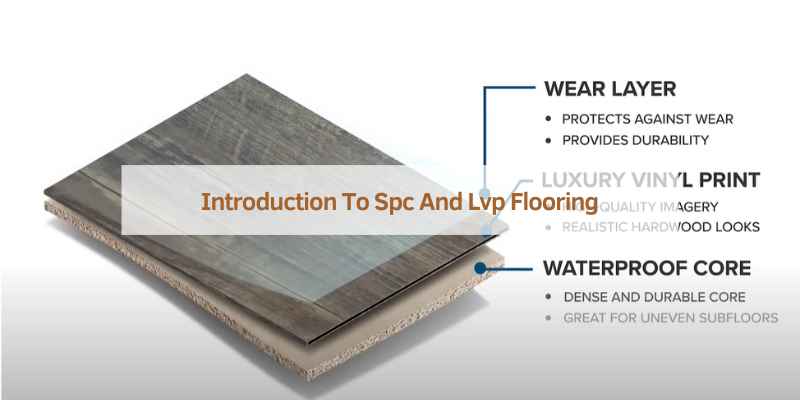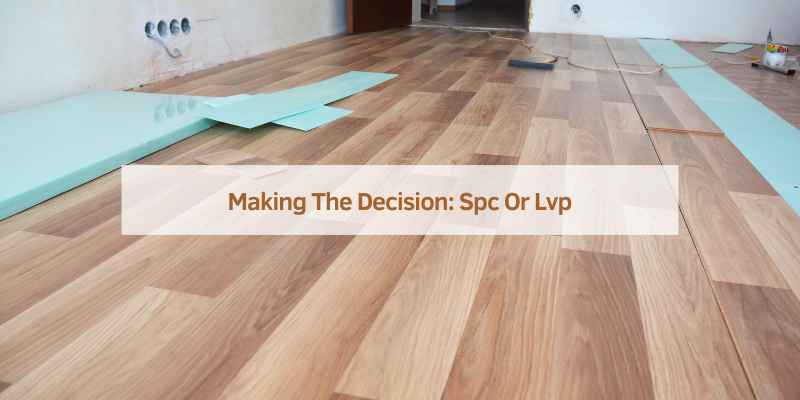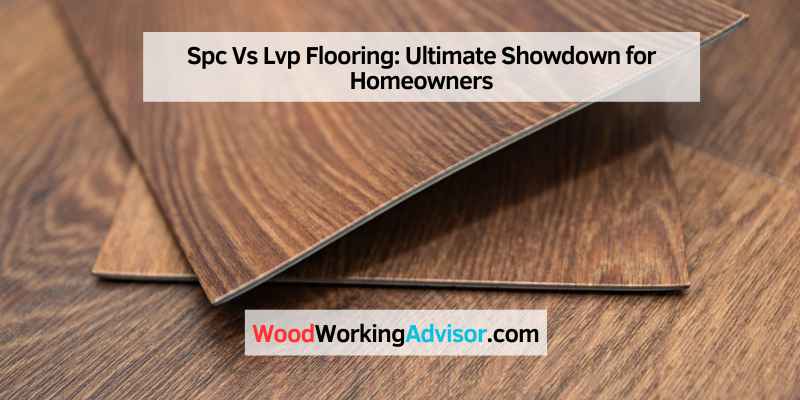SPC (stone-plastic composite) flooring is more water-resistant than LVP (luxury vinyl plank) due to its solid core composition. While LVP is also water-resistant, it may not be as resistant to moisture penetration as SPC.
SPC has a longer lifespan and better resistance to dents, scratches, and impact, making it a more durable option. LVP is thinner and more flexible, giving it a softer and more comfortable feel underfoot, making it ideal for living rooms, bedrooms, and playrooms.
Both SPC and LVP offer affordable alternatives to natural materials like solid hardwood and tiles, but SPC is generally more expensive than standard LVT (luxury vinyl tile). When deciding between SPC and LVP, consider the level of water-resistance, durability, and flexibility needed for your space.
Introduction To Spc And Lvp Flooring
If you’re considering new flooring options for your home, you may have come across SPC and LVP. Both SPC (Stone Plastic Composite) and LVP (Luxury Vinyl Plank) flooring have gained popularity due to their durability, affordability, and versatility. In this article, we will explore the key characteristics of SPC and LVP flooring, helping you make an informed decision for your flooring needs.
Key Characteristics Of Spc
- Durability: SPC flooring is known for its exceptional durability. Its solid core composition makes it highly resistant to impact, scratches, and dents, making it an ideal choice for high-traffic areas.
- Water Resistance: SPC flooring is highly water-resistant, making it suitable for areas prone to moisture, such as bathrooms, kitchens, and basements.
- Stability: The solid core of SPC flooring provides excellent stability, preventing it from expanding or contracting under different temperature and humidity conditions.
- Easy Installation: SPC flooring is designed for easy installation, thanks to its click-lock system. It can be installed over various existing subfloors, saving time and effort during the installation process.
- Realistic Appearance: SPC flooring comes in a wide range of designs, mimicking the look of natural materials like wood and stone. It offers the beauty of these materials without the high maintenance and cost.

Key Characteristics Of Lvp
- Flexibility: LVP flooring is thinner and more flexible compared to SPC. While still durable, it may not offer the same level of rigidity and impact resistance as SPC.
- Water Resistance: LVP flooring is also water-resistant, although it may not be as resistant to moisture penetration as SPC. It is suitable for areas with moderate moisture levels.
- Comfort: LVP flooring provides a softer and more comfortable feel underfoot compared to some other flooring materials.
- Easy Maintenance: LVP flooring is easy to clean and maintain, requiring minimal effort to keep it looking its best.
- Wide Range of Styles: Like SPC, LVP flooring offers a wide range of styles and designs, allowing you to choose the look that best suits your aesthetic preferences.
Both SPC and LVP flooring have their unique characteristics and advantages. Ultimately, the choice between the two will depend on your specific needs, budget, and the area where you plan to install the flooring. Consider factors such as durability, water resistance, and desired aesthetic to make the right decision for your home.
Water Resistance Comparison
When it comes to water resistance, both SPC (Stone Plastic Composite) and LVP (Luxury Vinyl Plank) flooring have their own unique properties. Understanding the differences between the two can help you make an informed decision about which type of flooring is best suited for your needs.
Spc In Damp Environments
SPC flooring is known for its exceptional water resistance, thanks to its solid core composition. This makes it a great choice for damp areas such as bathrooms, kitchens, and basements. The solid core not only provides excellent water resistance but also enhances the overall durability of the flooring.
Lvp’s Moisture Resistance
While LVP flooring is also water-resistant due to its core composition, it may not offer the same level of moisture resistance as SPC. It is important to note that LVP is designed to withstand spills and splashes, but prolonged exposure to moisture or standing water may lead to damage.
To help you visualize the water resistance comparison between SPC and LVP flooring, here is a simple breakdown:
| SPC Flooring | LVP Flooring | |
|---|---|---|
| Water Resistance | Excellent | Good |
| Recommended Areas | Bathrooms, kitchens, basements | Low-moisture areas |
| Tolerance to Standing Water | High | Low |
It’s important to consider your specific environment and the level of moisture exposure when choosing between SPC and LVP flooring. If you anticipate high levels of moisture or the possibility of standing water, SPC flooring would be the ideal choice due to its superior water resistance.
However, if you are looking for a flooring option for low-moisture areas such as living rooms or bedrooms, LVP can still provide adequate water resistance and durability.
Remember, proper installation and maintenance are key to maximizing the water resistance of any type of flooring. Be sure to follow the manufacturer’s guidelines and consult with a professional if needed.
In conclusion, when it comes to water resistance, SPC flooring has the upper hand in damp environments, while LVP flooring offers good water resistance for low-moisture areas. Consider your specific needs and make an informed decision based on the level of moisture exposure in your space.
Durability And Lifespan
Durability and Lifespan of SPC Vs LVP Flooring
When choosing between SPC (Stone Plastic Composite) and LVP (Luxury Vinyl Plank) flooring, considering their durability and lifespan is crucial. Both options offer distinct advantages, and understanding their specific strengths in this regard can help you make an informed decision for your space.
Spc’s Strength Against Heavy Objects
SPC flooring is renowned for its exceptional strength, especially when it comes to withstanding heavy objects. Its solid core composition provides unparalleled durability, making it highly resistant to damage caused by heavy furniture or other weighty items. This robust construction ensures that SPC flooring maintains its integrity even in high-traffic areas, making it a long-lasting flooring solution for homes and commercial spaces alike.
Lvp’s Resistance To Dents And Scratches
LVP flooring boasts impressive resistance to dents and scratches, offering a reliable solution for areas prone to heavy foot traffic and potential impact. The wear layer of LVP provides a protective barrier, ensuring that the flooring maintains its pristine appearance even in the face of daily wear and tear. This resilience makes LVP an ideal choice for busy households and commercial environments where maintaining a polished look is essential.
Comfort And Feel Underfoot
When it comes to comfort and feel underfoot, both SPC and LVP flooring options offer unique characteristics that cater to different preferences.
The Cold Touch Of Spc
SPC flooring, known for its solid core composition, provides excellent water resistance, making it ideal for areas prone to moisture like bathrooms and kitchens.
Lvp’s Softer, Flexible Nature
LVP flooring, on the other hand, is softer and more pliable than SPC, offering a comfortable underfoot feel that is perfect for areas where comfort is a top priority.
Cost Considerations
When choosing between SPC and LVP flooring, cost is an essential factor to consider. Understanding the pricing differences and the long-term investment value of each option can help you make an informed decision.
Spc Vs. Natural Material Costs
SPC flooring offers a cost-effective alternative to natural materials such as solid hardwood and stone. While it provides the aesthetic appeal of these materials, it comes at a more budget-friendly price point. This makes SPC a desirable option for homeowners seeking the look of high-end flooring without the hefty price tag.
Comparing Lvp And Spc Pricing
When comparing pricing, SPC is generally more affordable than natural materials it aims to replicate, such as solid hardwood and tiles. However, in comparison to standard LVT, SPC may be priced slightly higher. It’s essential to weigh the cost differences against the durability, water resistance, and longevity offered by SPC and LVP flooring options.
Alternative Flooring Options
When it comes to alternative flooring options, two popular choices are SPC and LVP flooring. SPC flooring is highly water-resistant and ideal for damp areas like bathrooms and kitchens, while LVP is water-resistant but may not be as resistant to moisture penetration as SPC.
Additionally, SPC is generally more durable and resistant to dents and scratches, while LVP is more flexible and offers a softer feel underfoot.
When it comes to choosing the right flooring for your space, there are many options to consider. Two popular alternatives to traditional hardwood flooring are SPC (Stone Polymer Composite) and LVP (Luxury Vinyl Plank) flooring. However, if these options don’t quite fit your needs, there are other alternatives to consider.
Engineered Wood Vs. Lvp
While LVP offers durability and water-resistance, engineered wood flooring can provide the look and feel of real hardwood with added durability. Engineered wood floors are constructed with layers of wood veneer and plywood, making them more resistant to moisture and humidity than traditional hardwood floors.
Other Alternatives To Consider
- Laminate flooring: Laminate flooring is a popular alternative to traditional hardwood flooring. It is made of layers of synthetic materials that are fused together and then topped with a high-quality image of wood grain or stone.
- Bamboo flooring: Bamboo flooring is an eco-friendly option made from the fast-growing bamboo plant. It is durable and has a unique, natural look.
- Cork flooring: Cork flooring is another eco-friendly option made from the bark of cork trees. It is soft and comfortable underfoot and has natural sound-absorbing properties.
Installation And Maintenance
When it comes to choosing between SPC and LVP flooring, it’s essential to consider their installation and maintenance requirements. Understanding the ease of installing each type and the long-term maintenance they entail can help you make an informed decision for your space.
Ease Of Installing Spc And Lvp
Installing SPC flooring is a relatively straightforward process, making it a popular choice for DIY enthusiasts. With its click-lock installation system, SPC planks can be easily interlocked, eliminating the need for adhesives. This simplifies the installation process and allows for quick and efficient completion.
LVP flooring also offers a user-friendly installation process. Similar to SPC, LVP utilizes a click-lock or glue-down installation method, providing flexibility based on the specific requirements of the space. Whether you opt for the ease of click-lock installation or the added security of glue-down application, LVP offers versatility in its installation options.
Maintaining Your Floors Over Time
Maintaining SPC flooring is hassle-free, requiring minimal upkeep to retain its pristine appearance. Regular sweeping and occasional mopping with a gentle cleaner are usually sufficient to keep SPC floors looking their best. Additionally, the water-resistant nature of SPC makes it suitable for high-moisture areas, simplifying maintenance in spaces like bathrooms and kitchens.
LVP flooring maintenance is similarly low-maintenance, offering easy upkeep for busy households. Regular sweeping and occasional mopping with a mild cleaning solution help preserve the visual appeal of LVP floors. This ease of maintenance, combined with its water-resistant properties, makes LVP an ideal flooring choice for various areas within the home.
Making The Decision: Spc Or Lvp
Choosing the right flooring for your home can be a challenging decision. With the plethora of options available in the market, it’s crucial to weigh the factors and make an informed choice between SPC (Stone Plastic Composite) and LVP (Luxury Vinyl Plank) flooring. Both options have their unique characteristics and benefits, so understanding the key differences and considering various factors can help you make the right decision for your home.
Factors To Consider
When deciding between SPC and LVP flooring, there are several factors to take into account to ensure you make the best choice for your home:
- Water Resistance: Consider the level of water resistance required for the specific areas where the flooring will be installed, such as bathrooms, kitchens, and basements.
- Durability: Evaluate the durability of the flooring in terms of resistance to dents, scratches, and impact, especially if you have high foot traffic or pets in your home.
- Comfort: Think about the underfoot feel and temperature of the flooring, as well as the level of rigidity and flexibility.
- Cost: Compare the pricing of SPC and LVP flooring, including installation costs, to determine the most cost-effective option for your budget.
- Appearance: Consider the visual appeal and design options available for both SPC and LVP flooring to complement your home’s aesthetic.
Final Recommendations For Homeowners
After considering the factors mentioned above, it’s important to weigh the pros and cons of SPC and LVP flooring based on your specific requirements. If you prioritize extreme water resistance and superior rigidity, SPC flooring might be the ideal choice for areas prone to moisture and heavy use. On the other hand, if you seek a more budget-friendly option with a softer underfoot feel and a wide range of design options, LVP flooring could be the perfect fit for your home. Ultimately, the decision between SPC and LVP flooring depends on your individual needs, preferences, and the unique characteristics of each type of flooring..

Frequently Asked Questions
Which Is Better, Spc Or Lvp?
SPC is better for water resistance, ideal for bathrooms and kitchens. LVP is water-resistant but may not be as resistant to moisture as SPC. SPC is more durable and less prone to dents and scratches compared to LVP. SPC is generally more affordable than solid hardwood and tiles.
What Are The Disadvantages Of Spc Flooring?
SPC flooring may not match the strength of natural materials like stone and can be damaged by heavy objects. It can feel colder underfoot compared to wood.
Which Is More Expensive Spc Or Lvt?
SPC is generally more affordable than solid hardwood and tiles, but it’s typically more expensive than standard LVT.
What Flooring Is Better Than Lvp?
LVP (Luxury Vinyl Plank) flooring is a great choice for its durability and scratch resistance. However, if you’re looking for something even better, engineered wood flooring is a popular option. It offers the look and feel of real wood while being durable enough to withstand heavy foot traffic.
Conclusion
Both SPC and LVP flooring have their unique advantages and considerations. SPC offers superior water resistance, making it ideal for damp areas. On the other hand, LVP is more flexible and comfortable underfoot, suitable for living spaces. Consider your specific needs when choosing between the two.


